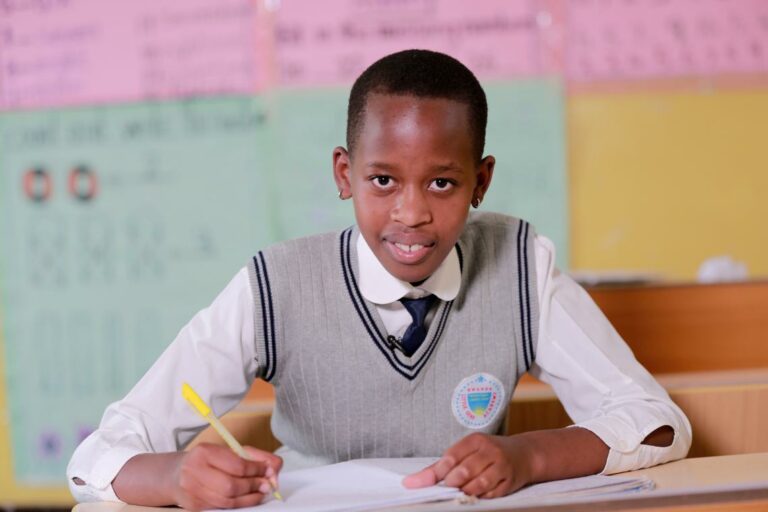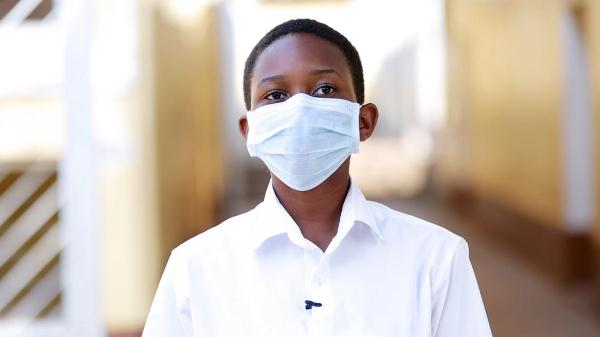
Keeza Nyandekwe, 12, studies at Little Gems Academy and is now preparing to take the primary leaving national exams to progress to secondary level
Rwanda is gearing up for the National Exams, marking a milestone for students and schools following the disruption caused by the COVID 19 pandemic.
The National Exams kick off on 12 July, with over 450,000 pupils sitting for exams at all levels across the country.
These exams are made possible through the resilience and determination of teachers, students, and families, who quickly adjusted to the new realities of school closures, remote learning from home, school calendar amendments, safe school reopening, and remedial education.
Despite uncertainties caused by the pandemic, learning has continued, and these exams offer the students the opportunity to progress to the next level of education of their choice.
“We were supposed to finish Senior 6 (Grade 12) in 2020, but due to the COVID-19 pandemic, our school year was extended by six months,” says 18-years-old Victoria Bamurange, a student at Lycée de Kigali school in the capital of Rwanda. Like many other students, Victoria had to quickly adapt to different learning methods during school closure in 2020, which included accessing remote learning at home, and remedial education once schools re-opened to help prepare for the National Exams. “We were worried that we might have to repeat a year, but thankfully we were able to come to school and now we are taking the exams.”

“I want to study computer engineering to start my own business in the future.” Deborah Mugabo,
“I wish to study computer science, specifically computer engineering. Since I was little, I have always been obsessed with dissembling things and playing with hardware,” shares Victoria. She adds, “If I get a computer science degree, I want to produce hardware equipment here, especially for the education and health sectors.”
Speaking about the time when schools were closed and parents were also working from home, she reflects: “That was an unusual experience, but I also believe it was productive. It was unusual to have your parents stay home at all time, while you were studying.”
“I missed contact with my friends and being in touch with them. It was hard to only text and chat online. I also missed being in school,” she added.
As a senior 6 student, Victoria, will be writing the national exam to determine her future education pathway and which higher education institution she will attend. “Our teachers helped us the best they can to catch up with our programme and learning and prepare us for the exam. Even when we were home last year, they sent us exercises online to help our study as we are in the exam year.”
“I am excited and nervous at the same time about the National Exams,” shares Deborah, 16, in Senior 3 (Grade 9) at Lycée de Kigali. “I want to study computer engineering, and after the exams, I want to take time to read more about it.”
“We have been using online platforms, with materials sent to us by teachers to study. Because of those exercises, I am confident that we will pass the exams.”
“When schools were closed, we were worried that we would have to repeat another year.” When asked what she aspires to become, Deborah said, “I want to study computer engineering to start my own business in the future.”
With the outbreak of COVID 19, schools in Rwanda were closed in March 2020, partially re-opening in November 2021 and then fully re-opening in February 2021.
But learning didn’t stop with school closures. With the support of UNICEF and other partners, the Ministry of Education quickly developed and implemented an education plan to deal with disruptions caused by COVID 19, which included developing and disseminating remote learning lessons through radio, TV, and online learning. It is estimated that approximately 2.5 million learners accessed such remote learning while schools were locked down.
“The pupils who are sitting for their primary leaving examinations have benefited from a good multi-stakeholder collaboration. When schools were closed, the Ministry of Education and partners came together to develop remote learning content to help students learn from home. When schools resumed, remedial education was put in place to ensure the students are given proper support. Partners like UNICEF have contributed to both initiatives and we are happy for this achievement despite difficult circumstances” says Hon. Gaspard Twagirayezu, the Minister of State in charge of Primary and Secondary Education.
“The past 15 months have witnessed many innovative methods to keep children learning and collective efforts saw students continue their education, catch up on any lost learning and complete the school year. We wish students all the best for the upcoming national examinations”, said Mayam Mouarangue, Officiating Representative, UNICEF Rwanda.
Keeza Nyandekwe, 12, studies at Little Gems Academy and is now preparing to take the primary leaving national exams to progress to secondary school. “I am excited to take the national exam and I am ready for it,” shares Keeza.
With her favorite subject being Mathematics, she hopes by passing the exams it will help her move on the track to achieving her dreams. “Passing this exam in this grade will be the first step to help me become a doctor.”
Like many of her peers, Keeza had to learn remotely for much of last year. “We are preparing for the national exam by doing weekly tests and many exercises shared by our teachers.”
With a progressive reopening of schools, in-class learning was restored, thanks to a tremendous effort to ensure that schools were safe, and by March 2021, 95 per cent of primary school students were back in class.
Remedial education 1 and catch-up classes were organized, including by UNICEF, which supported a remedial education programme in 150 schools benefitting 11,500 students at risk of dropping out, in partnership with the Ministry of Education and Imbuto Foundation.
22-year-old Marie Chantal, a student at G.S Gahanga, living in Centre Inshuti Gahanga (for children with disabilities), aspires to be a journalist after passing the national exams. “After finishing my studies, I want to become a journalist because I like to work in the media.” She adds, “I love journalism so much, and I will also be able to study literature where I can learn to write articles and other types of writing as well as performing different plays.”
Marie Chantal will be sitting for the senior 6 national exam. Aided by a computer to help her study for the exams, she feels more than ready to write the exam that will take place in the coming weeks. “I have the confidence,” she says with a warm smile and hope for a bright future ahead.
Being born with a disability has not stopped Marie Chantal from pursuing her education.
She is worried about some challenges that students like her might face while taking the exams. “Firstly, we use the braille typing machines, and I’m slow. I would like that they increase time for writing the exam for us. Another potential challenge is accessing the exam site and using the hand-washing facilities there”.
To address these concerns, UNICEF, in partnership with Humanity and Inclusion, is supporting the Ministry of Education to strengthen access and learning for children with disabilities in 60 inclusive education schools, two in each District.
Regardless of the challenges, Marie Chantal is hopeful and beaming with optimism.
“What I can say to my classmates who live with disabilities is that we are able to study and achieve our dreams like all other children. There’s no difference,” she says. “For example, on my side, I plan to become a journalist, and my disability cannot prevent me from doing all I can to achieve it. So, we’re able!”(End)
